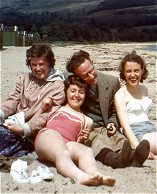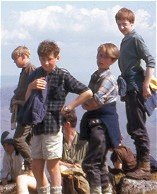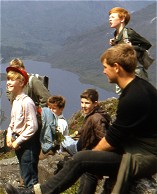8th April 1967 - Torside Clough
The following members assembled at the School Gates or Marple Bridge, to board Kirkpatrick's bus for the Flouch Inn (A628, near Langsett. Fare: 2/-):
| Rex Woolley | Frances Nolan | Noel Flunder | Lynn Condron |
| John Truman | Craig McCormack | Mary Boothroyd | Phil McFall |
| Graham Davenport | Paul Andrew | Elizabeth Ketley | Geoff Priestner |
| Chris Gorman | Elaine Mulligan | Lynn Hallas | Jean Crossley |
| Stephen Priestnall | Linda Bentley | Terry Linton | Leaders |
| Paul Tatton | Hilary Andrew | Rickie Linton (primary) | F R Mason |
| Andrew Hill | Ian Ellison | Andrew Banwell | R Booth |
| Bill Smith | Anne Jaffet | Phil Woodhouse | Julian McIntosh |
| Andrew Howie | Graham Hutchinson | Neil Crawford |
Rain started as we left Marple and continued, with short breaks, throughout the day. Entered cloud at about 1,000ft on the Woodhead road - this gave a foretaste of what we were to endure on this day.
Arrived at the Flouch Inn shortly before 10 o'clock - as it was raining those of us with suitable rain proof clothing donned it. It was disappointing to see how few members carried clothing suitable to protect the body from continuous cold rain. Before the bus left the suggestion was made that those who did not fancy the weather prospects should return with the bus; no one accepted the offer.
Hoping for improvement in the weather we set off along the path to the bridge and weir on the Little Don. Here we stopped to check our route before cutting over the flank of Hingcliff Hill to the junction of Mickleden Beck and River Don; here we noticed plenty of water in the river due to continuous rain. Followed the river up Hordron Clough, with plenty of crossings and re-crossings where the banks were steep.
Near Harden Clough we stopped at a hut for lunch - we (some of us) were able to get into the hut to eat. Some members wrenched a sheet of corrugated iron away and got into the larger room. They were told to come out, and the corrugated iron was replaced at least as well as it was before our visit. Many of us ate our sandwiches in the rain.
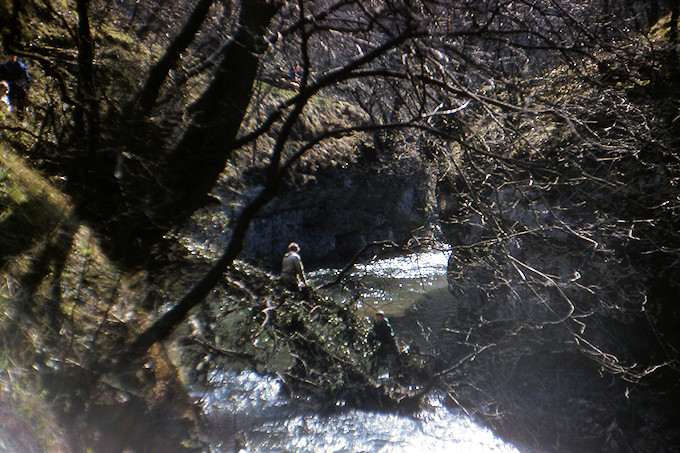
WW1962-004 an image from 1962
After lunch we continued up Loftshaw Brook - we tended away from the brook towards the main road, but then set course across the bogs towards Round Hill. Several of the youngsters wanted to join the road and thumb a lift back to Glossop but, of course, this is not allowed, except in an emergency. On Round Hill Linda Bentley complained of tummy pains - she was consoled and given two aspirin.
Then we pressed on across the Small Clough, Rose Clough, Far, Middle and Near Black Cloughs. The miles seemed very long, the going through heather, across bogs and up and down the numerous groughs was very exhausting. Most of the time we were in cloud with visibility around fifty yards - rain continued to fall, sometimes heavily. Many of the children complained of cold - mainly due to the wrong sort of clothing; not enough wool, too much cotton and nylon, not enough wind protection.
Owing to the wind and rain, the leader was reluctant to get maps out very often, but just kept on compass course. This was satisfactory but, not knowing all the cloughs along the northern edge, it was difficult to estimate progress and several over-estimates of the distance covered tended to demoralise the children when we found the mistake. This happened particularly as we approached Shining Clough and Wild Boar Clough - this was due to not being acquainted with all the Cloughs.
Although the members found the going across the bogs, heather and groughs very exhausting, they tackled the steep rocky descent into the clough, and the equally steep climbs out, with enthusiasm and enjoyment. This was most marked at the steepest and deepest - Torside Clough.
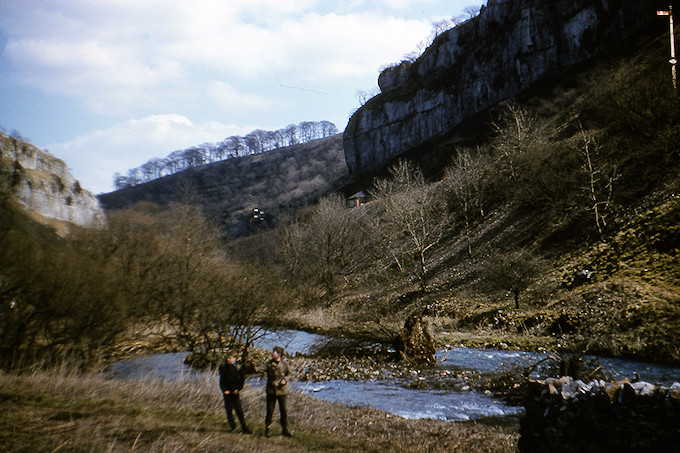
WW1962-006 an image from 1962
In Torside Clough the streams were swollen from continuous rain, and the crossing was hectic and exciting - several members got a wetting. The methods of crossing, and some of the crossing places were, to put it mildly, hair raising - however we all survived without serious mishap.
Graham Booth's crossing point was probably the most hair raising, and yet the simplest. Above a low boiling roaring waterfall a pointed rock projected; on one side of the river was a slab of rock to take off from, on the far side a sloping ledge to land on. The method was to quickly place one foot on the point of the mid-stream rock - this was full stretch - and then continue the movement bringing the rearward leg forward and finishing the crossing in a leap to the far ledge. A most exciting proceeding.
Mr Booth crossed, and helped many of the smaller ones to cross, a little higher up; this also looked rather risky, but none of those who crossed with Mr Booth's help got more than wet feet.
Then, after the steep climb up the westerly bank, there followed the long drag up to the summit of Peaknaze Moor, and then down to the old quarries. Here Stephen Priestnall complained of sickness and asked to rest. We were by now about 3 hours behind schedule - Stephen rested and was given a couple of Glucose tablets. It was learned later that he'd eaten only one sandwich all day, and the time was then nearly 8 o'clock. We had been on that tough route for nearly ten hours.
Mr Mason decided that the main party should continue - they were wet and cold as well as very late, and he would stay with Stephen. However, Mr Booth suggested that he stay, and Mr M should take the party on and attempt to arrange a duplicate bus from Glossop. This was done, except that Phil McFall and Bill Smith volunteered to stay with Stephen and Mr Booth. However their wait was not long - the glucose soon provided the needed energy and they were only a few hundred yards behind when we reached Glossop.
The time was about 8.25pm when we reached Glossop town centre. Could not arrange a duplicate bus, but the service bus came in early and we were allowed to occupy it while we awaited departure. It was nearly 10 o'clock when we reached Marple.
No other people were seen during that long, exhausting, uncomfortable, but somehow very satisfactory expedition. Nothing to report to the Planning Board.



